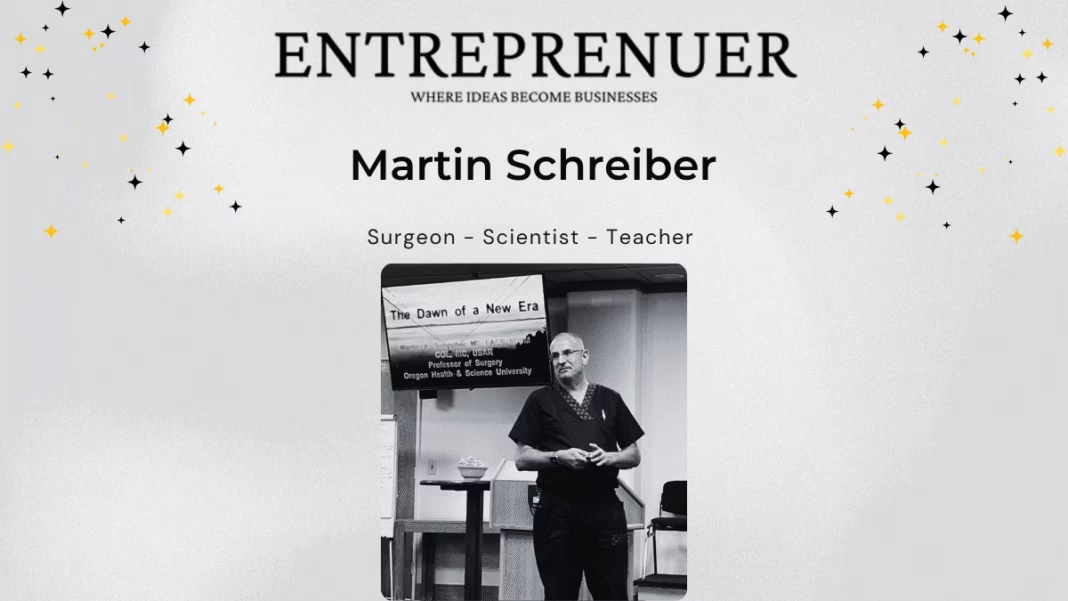Dr. Martin Schreiber has been invited to deliver the keynote address at the North Pacific Surgical Association meeting in Banff, Canada, beginning November 21, 2025. The meeting theme is military and civilian collaborations. His talk will pose a direct question. Are we ready for Large Scale Combat Operations? He will address that question from both the military and the civilian standpoint.
This invitation reflects a career built on preparation, teamwork, and science. Dr. Schreiber studied chemistry at the University of Chicago. He earned his medical degree at Case Western Reserve University. His surgical training took him through Madigan Army Medical Center and the University of Washington. At the University of Washington, he served as chief resident and completed a fellowship in trauma and surgical critical care.
He is an educator as well as a surgeon. He taught at Texas Tech University, Baylor College of Medicine, and the Uniformed Services University. He later joined Oregon Health & Science University. At OHSU, he became Professor of Surgery and also held appointments in physiology, pharmacology, and regenerative medicine. He led the Donald D. Trunkey Center for Civilian and Combat Casualty Care. In that role, he worked to advance trauma science and prepare both military and civilian teams for complex events.
His professional service is notable. He is a Fellow of the American College of Surgeons. He has served as Region X Chief of the Committee on Trauma. He also chaired the Advocacy Committee of the Board of Governors. These roles show a steady focus on standards, systems, and patient outcomes.
The topic of Large Scale Combat Operations (LSCO) adds urgency to this year’s program. Events on that scale produce mass casualties. They strain supply chains. They test communication and command. They expose gaps between military doctrine and civilian hospital reality. Dr. Schreiber has spent years working at that intersection. He translates lessons from the field into protocols that fit trauma networks called Regional Medical Operations Coordination Centers or RMOCCs that may be called upon to manage thousands of casualties per day if LSCO occurs. The resources of both military treatment facilities and the VA will be overwhelmed in days and the civilian sector will be called upon to help manage these casualties. Success depends on coordination across agencies, borders, and disciplines.
Surgeons from across the Northwest will attend the NPSA, including teams from the United States and Canada. Their hospitals vary in size and resources. Some serve dense cities. Others serve remote communities. The challenges differ, but the aim is the same. Move the right patient to the right care at the right time. That requires shared language and shared drills. It requires transmitting data way ahead of the patient. It requires training that is realistic and repeatable. It also requires leadership that keeps teams calm when the numbers are large and the minutes are few.
The North Pacific Surgical Association is one of the oldest surgical organizations in the nation. It was established in 1912. Its history is a narrative of surgeons sharing knowledge and elevating the standard of patient care. Hosting this conversation today continues that tradition. The setting in Banff offers fresh air and clear focus. The agenda brings together voices from trauma surgery, critical care, anesthesiology, emergency medicine, logistics, and systems management. The goal is practical. Turn insight into action.
Readiness will be the thread that ties the keynote together. Readiness starts before the alarm. It begins with education for every team member. It continues with supply plans that assume scarcity. It relies on blood management strategies that work when demand surges. It depends on prehospital protocols that shorten the time to hemorrhage control. It asks hospitals to practice how they will expand capacity for hours and days, not just a single afternoon. It pushes leaders to build relationships across state and provincial lines so that help arrives early, not late.
Dr. Schreiber will close with a simple charge. Turn talk into drills, drills into habits, and habits into lives saved. The question in Banff on November 21 is not only whether we are ready for LSCO. It is whether each hospital, each team, and each leader is ready to act together when the call comes. If we leave with shared plans, clear roles, and a calendar of joint exercises, this keynote will have done its job.
For more inspiring interviews, follow us on Facebook for updates.

